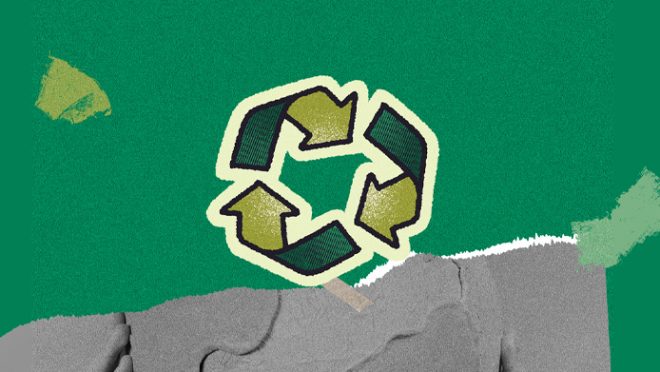Flip the script: Master the 5R’s this Global Recycling Day
Flip the script: Master the 5R’s this Global Recycling Day

18 March is Global Recycling Day. Last year on Earth Day, Chief Advisor and Nobel Laureate Professor Muhammad Yunus urged young people to adopt the 5R’s for activating 3Zero Clubs and embracing the roles of 3Zero Persons to create a sustainable future.
These 5R’s—Refuse, Reduce, Reuse, Repurpose, and Recycle—are rooted in the EU’s Waste Framework Directive (1975). Instead of starting with recycling, this approach prioritises waste prevention first. They are your essentials to fight climate change at every step.
Let’s explore how you, as a student, can implement the 5R’s in your daily life and make a real impact.
Step 1: Refuse – Say no to waste
By refusing waste at the source, you’re already reducing your environmental footprint. This means saying no to unnecessary waste before it even enters your life. For example,
- Refusing single-use plastics like straws, cutlery, and bags. Carry your own reusable alternatives.
- Saying no to freebies or promotional items you don’t need, like flyers or cheap trinkets.
- Opting out of paper receipts and going digital whenever possible.
Step 2: Reduce – Cut down on what you use.
Reducing isn’t about deprivation; it’s about making smarter, more sustainable choices. This allows you to be more mindful of what you buy and use. Make sure that you:
- Buy only what you need—avoid impulse purchases.
- Use digital notes and textbooks to reduce paper waste.
- Cut down on energy use by turning off lights and unplugging devices when not in use.
Step 3: Reuse – Give items a second life
Before throwing something away, ask yourself: Can I reuse this? Reusing items not only saves money but also keeps them out of landfills. You can always
- Use refillable water bottles and coffee cups instead of disposable ones.
- Repurpose old jars as storage containers or planters.
- Donate or sell clothes, books, and electronics you no longer need instead of tossing them.
Step 4: Repurpose – Get creative with waste
Repurposing is where creativity meets sustainability—it’s fun, practical, and eco-friendly. If you can’t refuse, reduce, or reuse, try repurposing items to give them a new function. Here’s how:
- Turn old t-shirts into cleaning rags or tote bags.
- Use cardboard boxes for organising your room or as DIY project materials.
- Make planters out of old plastic containers.
- Transform empty jars into desk organisers or art supplies.
Step 5: Recycle – The last resort
Finally, when all else fails, recycle. Recycling is a critical step in protecting our planet, conserving finite resources, and reducing greenhouse gas emissions. By responsibly processing waste into new materials, we minimise environmental harm and move closer to a sustainable future. It’s not just an option—it’s a necessity for the health of our planet. As a student, you can
- Learn your campus recycling guidelines—what can and can’t be recycled.
- Properly clean and sort recyclables to avoid contamination.
- Recycle e-waste like old phones and laptops at designated drop-off points.
- Compost food scraps if your locality or campus has a composting programme.
- Join or start a recycling club to promote sustainability on campus.
This Global Recycling Day, let’s go beyond recycling and embrace the full potential of the 5 R’s. Start small, think creatively, and inspire others to join you. Together, we can create a sustainable future where nothing goes to waste—not our resources, not our potential, and certainly not our planet.


